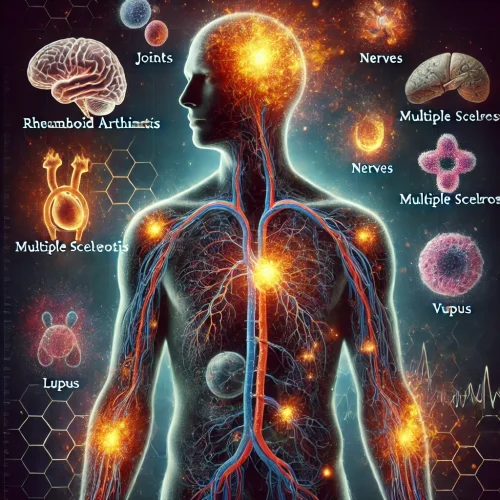How Many Autoimmune Diseases Are There?
Here’s a breakdown of the 20 most recognized autoimmune diseases, along with a brief explanation of each:
- Type 1 Diabetes
The immune system attacks insulin-producing cells in the pancreas, leading to high blood sugar levels. - Rheumatoid Arthritis (RA)
Affects the joints, causing pain, swelling, and deformity as the immune system attacks joint linings. - Lupus (Systemic Lupus Erythematosus, SLE)
A systemic condition where the immune system attacks multiple tissues, leading to fatigue, rashes, and organ damage. - Multiple Sclerosis (MS)
The immune system targets the protective covering of nerves (myelin), disrupting communication between the brain and body. - Psoriasis
An immune response causes skin cells to multiply rapidly, leading to scaly patches and inflammation. - Inflammatory Bowel Disease (IBD)
Includes Crohn’s disease and ulcerative colitis, where the immune system attacks the digestive tract. - Celiac Disease
Triggered by gluten, the immune system damages the small intestine lining, causing digestive and systemic symptoms. - Hashimoto’s Thyroiditis
The immune system attacks the thyroid gland, leading to hypothyroidism. - Graves’ Disease
Causes the immune system to overstimulate the thyroid gland, resulting in hyperthyroidism. - Sjogren’s Syndrome
Attacks glands producing tears and saliva, leading to dry eyes and mouth. - Ankylosing Spondylitis
Primarily affects the spine, causing inflammation, stiffness, and potentially fused vertebrae. - Myasthenia Gravis
Interferes with nerve-muscle communication, leading to muscle weakness and fatigue. - Scleroderma
Causes the immune system to attack connective tissues, leading to skin thickening and internal organ damage. - Vitiligo
Destroys pigment-producing cells in the skin, leading to patches of lost pigmentation. - Pernicious Anemia
The immune system interferes with vitamin B12 absorption, leading to fatigue and neurological issues. - Alopecia Areata
Targets hair follicles, causing sudden hair loss. - Addison’s Disease
Damages adrenal glands, leading to insufficient production of essential hormones. - Dermatomyositis
Causes inflammation in muscles and skin, leading to muscle weakness and a distinctive rash. - Guillain-Barré Syndrome
The immune system attacks nerves, leading to muscle weakness and paralysis. - Goodpasture Syndrome
A rare condition where the immune system attacks the lungs and kidneys, causing bleeding and organ damage.
Understanding the Impact
Autoimmune diseases are chronic conditions that often require lifelong management. They affect millions worldwide, with some estimates suggesting nearly 50 million Americans live with one or more autoimmune diseases. Globally, these conditions are on the rise, but the reasons remain unclear. Environmental factors, genetics, and even diet are believed to play a role in triggering autoimmune responses.
Why Awareness Matters
Understanding autoimmune diseases is crucial, not just for those living with these conditions but for their families, friends, and workplaces. Many autoimmune symptoms are invisible, leading to misunderstandings or a lack of empathy. Raising awareness helps reduce stigma and ensures those affected get the support and accommodations they need.
A Call to Action
If you or someone you know is navigating life with an autoimmune condition, remember: you are not alone. Seek out communities, stay informed, and advocate for yourself. Autoimmune diseases are complex, but knowledge and support can make the journey more manageable.
Let’s continue the conversation. What are your experiences with autoimmune diseases? Share your thoughts, questions, or stories in the comments or reach out directly. Together, we can foster understanding and build a more compassionate world.





